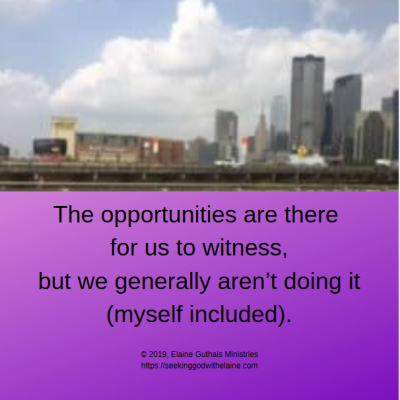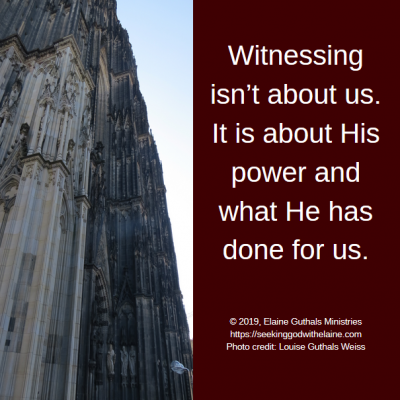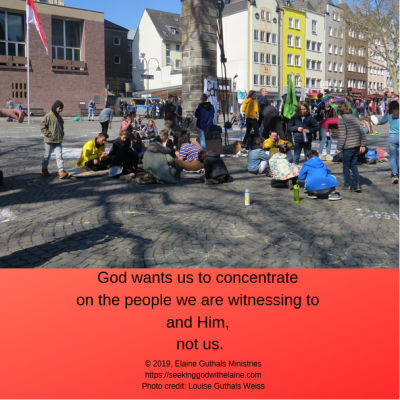I believed, therefore have I spoken.
Psalm 116: 10 (KJV)
Scripture: II Corinthians 4: 1-18
One of our jobs as believers is to share with others what God has done and is doing for us. Many times, though, we choose not to witness because we are insecure and do not want to risk a confrontation. This devotion looks at sharing what we believe.
Cliff Notes
- We have opportunities to witness but choose not to because we are insecure and do not want to risk a confrontation.
- The more we witness, the easier it becomes.
- Our fear of failure stops us from witnessing, even though not everyone is going to acknowledge God as Lord and Jesus as our Redeemer.
- We have to focus on God when witnessing and take the focus off of ourselves.

I have told you that I am a processor. A word or a phrase may trigger a thought that others may or may not see.
To read How Do We Wrestle with God?, click the button below.
Psalm 116 is one of those passages. If you look at it, it is about thanking God because He didn’t kill off the author. We should be thankful for all God does for us.
My nugget came in verse 10. The whole verse says, “I believed, therefore have I spoken, I was greatly afflicted” (Ps. 116: 10 KJV). The Good News Translation has it as “I kept on believing, even when I said …” The International Standard Version has “I will continue to believe, even when I say …” It is all here – past, present, and future.
We’ve also talked about the verbs in the Bible having those three aspects to them. That may be why the different translations take a different angle for this verse.
To read Why Do Christians Sin?, click the button below.
The “I believed, therefore I said” struck a chord with me. Believers don’t always do that.
Practice Makes Perfect, But What If We Can’t Practice?
Years ago, I was talking with some friends, most of whom are around my mother’s age. One lady mentioned it was hard for her to talk with others regarding Christianity because she didn’t have to practice it when she was young. When she was growing up, everyone she knew was a believer. She had no need to tell others.
But society has changed. Fewer people know Jesus. Society is more tolerant of differing beliefs – and of non-belief. Now we come into more contact with people who aren’t believers and need for us to tell them of Jesus’ love and sacrifice.
The opportunities are there for us to witness, but we generally aren’t doing it (myself included). We aren’t because, a lot of times, we are insecure about sharing our beliefs with others. We feel unsure about how to begin the conversations. We’re scared we will be rejected. We feel inadequate in our own walk with God. And we have had no practice.

Another reason we don’t witness is because religion has become taboo. The worldview demands believers not talk about their beliefs because they are seen as intolerant. We shy away from the confrontation. We dread the confrontation especially when we have had no practice in witnessing.
So, we say nothing. But by our silence, we then agree with the way the world is being run by Satan. We don’t take a stand for what we believe in.
What Did Paul Say?
Paul must have made the same connection that I did. (Yeah, me!) He also pulled out the nugget as a call to witness (II Cor. 4: 13). It is our job to tell others what we believe and what has been done in our lives by our loving Father.
Interestingly, Paul added some other nuggets that can help us. “… As we have received mercy, we do not lose heart” (II Cor. 4: 1 NKJV). Witnessing is hard and challenging. But we can’t give up. God doesn’t expect a perfect conversion rate. He doesn’t want us to get discouraged, so He made sure scriptures encouraged us.
Why won’t we have a perfect conversion rate? When we witness, not all will accept what we have to say. Nope, we aren’t guaranteed a 100% success rate. “But even if our gospel is veiled, it is veiled to those who are perishing” (II Cor. 4: 3 NKJV). Okay, sometimes the gospel is a little hard to understand (especially when Paul is talking).
Non-believers sometimes try to figure it all out. We are told to “… lean not on [our] own understanding” (Prov. 3: 5). It is even harder for non-believers to just take it on faith.
Few like rejection and failure. Sometimes, that makes us not want to put ourselves out there. If we are uncomfortable witnessing, that makes us even more uncomfortable.
The bottom line, though, is not everyone is going to acknowledge God as Lord and Jesus as our Redeemer. For whatever reason, they are going to choose not to put their faith in God. We have to remember that it is not us that non-believers are rejecting. It is God.
How Can God Use Our Flaws?
More times than not, we just don’t feel “qualified” to be witnesses. We see all of our faults and failures that we think disqualify us from being witnesses.
God thinks differently. “But we have this treasure in earthen vessels that the excellence of the power may be of God and not of us” (II Cor. 4: 7 NKJV).
Witnessing isn’t about us. It is about His power and what He has done for us. That is the message we are to get across.

We may use our experiences to apply it so those we are talking to can see the fit for their lives. But the message isn’t, “Oh, look at us.” The message is, “Look what God has done for us.”
How Do We Apply This?
We can’t care about the “we” part in witnessing. We have to concentrate on the “God” part. We won’t be us doing it, anyway. It will be God working through us.
That is, I feel, the main problem we have with witnessing. The focus is wrong. It is hard for us to see because we and the situation are all we see. We concentrate on the “we” part and forget about the “God” part.
God wants us to be bold and speak up for Him. He wants us to share His love with everyone. He doesn’t want us to concentrate on the consequences of witnessing. God wants us to concentrate on the people we are witnessing to and Him, not us.

Sometimes, we think we don’t have a compelling enough story to help win others to Christ. Luke 24: 48 says, “You are witnesses of these things” (NIV). We may not have been with Christ from the beginning as the disciple were (Jn. 15: 27), but we, too, have a relationship with Christ. We have our own stories to tell. People we talk to today will be more interested in how the gospel is relevant today, not 2000 years ago.
Remember, not everyone is going is going to accept what we are telling them. We have to do what Jesus told the disciples when He sent them out. “And if anyone will not receive you or listen to your words, shake off the dust from your feet when you leave that house or town” (Mt. 10: 14 ESV). We have to be ducks. Let is roll off our backs. Don’t take it personal like.
It is really important that we Oh, we have to take back the world from Satan. We have to prepare for the end times. The time is now for us to stand up and be counted. We have to up our witnessing game.
Heavenly Father. We believe in You. We believe You sent Your Son to save us from our sins. We believe You sent the Holy Spirit to guide us through our lives. We believe; therefore, we will tell others. Help us to overcome our inexperience, our fears and our insecurities. Put us in situations where we can share Your plan of salvation. Use us as instruments to bring others to You. Amen.
Paul’s Roman Road is a good tool to use when presenting the plan of salvation to a non-believer. For a refresher, click on the button below.
What do you think? What are some other issues that are stopping us from witnessing? Leave me a comment below (about this or anything else) or head over to my Facebook group for some interactive discussion.
If you have not signed up for the email daily or weekly providing the link to the devotions and the newsletter, do so below.
If God has used this devotion to speak with you, consider sharing it on social media.
Pingback: How Should We Give Thanks to God? – Seeking God with Elaine
Pingback: What Happens When We Hit Road Construction in Our Lives? – Seeking God with Elaine